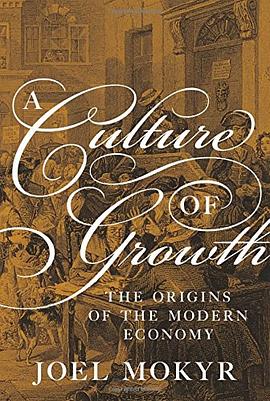A Culture of Growth
内容简介
During the late eighteenth century, innovations in Europe triggered the Industrial Revolution and the sustained economic progress that spread across the globe. While much has been made of the details of the Industrial Revolution, what remains a mystery is why it took place at all. Why did this revolution begin in the West and not elsewhere, and why did it continue, leading to today’s unprecedented prosperity? In this groundbreaking book, celebrated economic historian Joel Mokyr argues that a culture of growth specific to early modern Europe and the European Enlightenment laid the foundations for the scientific advances and pioneering inventions that would instigate explosive technological and economic development. Bringing together economics, the history of science and technology, and models of cultural evolution, Mokyr demonstrates that culture—the beliefs, values, and preferences in society that are capable of changing behavior—was a deciding factor in societal transformations.
Mokyr looks at the period 1500–1700 to show that a politically fragmented Europe fostered a competitive “market for ideas” and a willingness to investigate the secrets of nature. At the same time, a transnational community of brilliant thinkers known as the “Republic of Letters” freely circulated and distributed ideas and writings. This political fragmentation and the supportive intellectual environment explain how the Industrial Revolution happened in Europe but not China, despite similar levels of technology and intellectual activity. In Europe, heterodox and creative thinkers could find sanctuary in other countries and spread their thinking across borders. In contrast, China’s version of the Enlightenment remained controlled by the ruling elite.
Combining ideas from economics and cultural evolution, A Culture of Growth provides startling reasons for why the foundations of our modern economy were laid in the mere two centuries between Columbus and Newton.
......(更多)
作者简介
Joel Mokyr is the Robert H. Strotz Professor of Arts and Sciences and professor of economics and history at Northwestern University, and Sackler Professor at the Eitan Berglas School of Economics at the University of Tel Aviv. His many books include The Enlightened Economy and The Gifts of Athena (Princeton). He is the recipient of the Heineken Prize for History and the International Balzan Prize for Economic History.
......(更多)
目录
......(更多)
读书文摘
纯粹因为运气不好,一些国家被掠夺型领导所统治,或是与侵略型统治者比邻而居,这些统治者都创造出了阻碍经济增长,造成大量人类苦难的不良制度。虽然这些制度的合法性很低,但它们却可以通过高强度的高压政策来维持其存在一这本身就是维持不良制度既昂贵又低效的方式,从而更加剧了这一社会的贫困和落后。 因此,文化有助于决定什么样的制度会出现,但它不能保证结果。
进步的想法在逻辑上等同于一种对前辈们隐含的不尊重。
......(更多)






